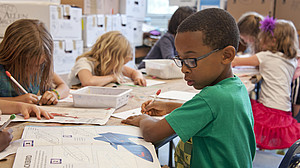Objectives of the philosophy of children and young people
Below you will find the goals of our institute
- Basic problems and questions of human existence can be the topic when philosophizing. For example: the relationship between human being, nature and technology, or individual and society. When children deal with such problems, they become aware of their own questions and thoughts. Furthermore, they learn to understand the rapidly changing society and world. Therefore, to philosophize helps to deal with basic questions when growing up.
- When doing philosophy one can clarify one’s thoughts, learn to discuss and give good reasons (clear phrasing, logically consistent thinking), become aware of language in general and exchange opinions and experiences. Children learn questioning techniques, group discussions and othe activities to develop thinking skills and concepts. Philosophizing together is a fundamental instrument to enhance respectfulness, openness and tolerance.
- With methodical abstract thinking during philosophizing, independent and critical thinking can be developed.
- Children reflect together and enjoy discovering things, asking new questions and finally finding solutions and answers. In other words, a “Community of Inquiry” is created.
- Doing philosophy boosts the self-esteem. Children become aware that their thoughts are valuable and everyone has unique ideas and thoughts. After a while, even shy children will actively participate.
- Philosophizing helps to get to know interdisciplinary coherences.
- Doing philosophy helps to build up a comprehension of democracy. Cultivation of human rights, mutual respect, tolerance and solidarity are practiced.
- Dialogue is practiced through philosophical inquiry.
- Doing philosophy helps to respect opinions and performances of other people. It will counter dogmatic compression and ideology-dependent manipulation in basic questions about our lives and thinking.
- Finally, yet most importantly, children think doing Philosophy is fun and interesting.

4 Philosophical reflection takes place together with other children and young people. Children and young people experience the joy of discovering things for themselves, raising questions in dialogue with others and ultimately finding solutions and answers. A "community of enquiry" (research community) develops.
5. philosophising increases self-esteem. Children and young people realise that their thoughts are valuable, important and often unique.
6. philosophising contributes to learning how to recognise interdisciplinary connections.
7. philosophising promotes competent education and engagement with the opportunities and risks of technologies - media skills - media ethics and media literacy.
8. philosophising promotes critical, creative and empathetic ("caring thinking") thinking.
9. philosophising can make a significant contribution to building an understanding of democracy. The prerequisites for this, namely the cultivation of human rights, mutual respect, tolerance and solidarity, are practised in philosophizing.
10. philosophizing about ethical issues offers guidance, examples can be used to consider how one would act and actions can be reviewed together. This can also be done by means of thought experiments. Philosophizing is thus contrasted with moral education.
11. philosophizing should educate people to respect the achievements and views of those who think differently. It should counteract dogmatic consolidation and ideologically dependent manipulation in fundamental questions of our life and thinking.
12. philosophizing strengthens individual resilience in order to be able to cope better with times of crisis.
13. last but not least, the interest, joy and pleasure of children and young people in philosophizing should be emphasised.
Austrian Center of Philosophy with Children and Youth
+43 (0)316 90370 201
Karmeliterhof
Karmeliterplatz 2, 2nd floor
8010 Graz, Austria
Mo - Th 08:00-16:00
Fr 08:00-12:00
kinderphilosophie-gesellschaft.uni-graz.at